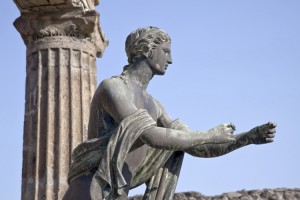Mythic Monday: Apollo of All Trades
January 23, 2017
A beautiful and versatile star of Greek mythology, Apollo was known as the god of light, the god of shepherds, the god of music, and the god of divination. He was also often thought of as the god of the sun. Considered the ideal of male beauty, Apollo was also associated with archery, healing, poetry, prophecy, purification, and seafaring. Only Zeus, his father and king of the gods, had more worshiping followers. Apollo was the son of Zeus and the goddess Leto. He was also the twin brother of the goddess Artemis. Apollo is the only Olympian god whose name was not changed when adopted into Roman mythology. The Romans were quite fond of Apollo, and the emperor Augustus made him his protector.

Apollo, the Greek and Roman god of light and many other things, is depicted in this statue at the ancient Roman city of Pompeii in Italy. Credit: © Thinkstock
Apollo was said to have slain a dragon named Python at Delphi and established a temple there. The Greeks believed Apollo foretold the future through an oracle (prophet) at Delphi. Temple priests asked questions of the oracle, an elderly woman named the Pythia, who responded in the words of Apollo. Because Python was sacred to Gaea the great mother goddess, Zeus exiled Apollo from Olympus and sentenced him to nine years on Earth. Among the mortals, he became a shepherd to Admetus, king of Thessaly. From his time on Earth, Apollo added god of shepherds to his overflowing résumé.
The Greeks sometimes blamed Apollo and his twin sister, Artemis, for sudden deaths. The pair killed the children of Niobe, queen of Thebes, who had boasted that she had more children and was superior to the twins’ mother, Leto.
For all his various talents and beauty, Apollo was unsuccessful in many of his love affairs. For example, he loved the nymph Daphne, but she fled from him. Apollo went after her, but before he could catch her, Daphne called out for help and was changed into a laurel tree. Apollo also loved Coronis, a mortal woman. But Coronis was unfaithful, and either Apollo or Artemis killed her and her lover.
As the god of music, however, Apollo enjoyed much more success, winning musical contests and producing songs of lyrical beauty. He is most often represented by the lyre, an instrument he played rather well. Apollo was touchy about his music, and he did not like to be told someone else’s music was better. He often “corrected” other people’s musical opinions by disciplining them. For instance, he turned King Midas’ ears into those of a donkey for preferring the music of the half-man, half-goat god of the woods, Pan.


